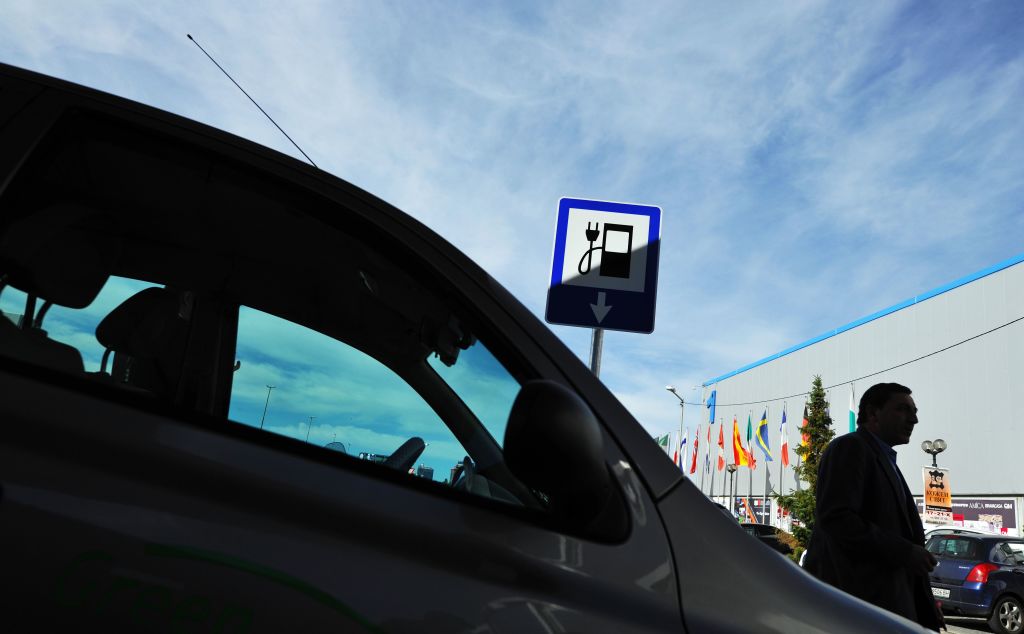Electric dreams: How long until electric cars go mainstream in the UK?

Visitors to the picturesque Whitby Bay beach in north Yorkshire were in for a shock earlier this month, when they encountered two giant footprints etched into the sand. The left was half the length of a football pitch, at 50 metres – the right was just 3.5 metres long.
The reason? A publicity stunt by EDF Energy to point out the vast difference between the carbon footprint of electric cars – the right foot – and conventional diesel and electric on the left. It may have stated the obvious – but the electric vehicle (EV) is only just catching on in the UK.
Read more: Electric car charging points outnumber petrol stations
Despite EVs having quadrupled their market share of all new car sales in the last four years, the figure still stands at less than 10 per cent, according to October’s statistics from the Society of Motor Manufacturers and Traders.
Moreover, only one third of consumers surveyed by digital agency Somo said they would consider switching to an electric car with their next buy.
Compare this to Norway, and the difference is stark. There, more than half of all new car sales are EVs. The future may well be electric – but Britain is clearly lagging behind.

What is the government doing?
In a bid to address this, the Department for Transport plans to boost the electric car market share to at least half by 2030, via its bold £1.5bn Road to Zero scheme. This involves pouring money into giving subsidies for people buying EVs, building new charging infrastructure and even introducing green license plates for electric cars.
Indeed, transport secretary Grant Shapps has said he is “determined electric vehicles become the new normal”.
However, car dealers are sceptical the plan will succeed. According to a recent survey of 200 dealerships by Close Brothers Motor Finance, two-thirds said the ambition of half of all new cars being electric by 2030 was unlikely to be realised.
What are the barriers?
Of those surveyed, four in five say electric cars are still too expensive. A gas-guzzling Nissan Micra will set you back just £18,000, while an electric Nissan Leaf costs about £28,000 – and that’s after a £3,500 government subsidy.
Meanwhile, just as many dealers think EVs need better range before they truly take off in the UK. Even a market-leading Tesla Model 3 will only do 250 miles on one charge – just enough to take you from London to Blackpool.
Graeme Cooper, project director for electric cars at National Grid, says: “The average person drives just 37 miles per day. Yet so often people buy a vehicle for the biggest journey they’ll ever do – which might be a 400-mile holiday to Cornwall once a year. If an electric car can’t do that on a single charge, they reject it as an option.”

Charging networks
Moreover, once you arrive in Blackpool, there are only 13 charging devices in the area, according to government data. Britain has more electric car charge points than normal petrol stations – around 15,000 – but there remain significant black spots in rural regions.
With the General Election looming, this has been an area in which both main political parties have made sweeping promises. Labour hopes to spend £3.6bn to build a “national network” of charging points, while Conservative Prime Minister Boris Johnson has pledged to make sure every UK household is within 30 miles of a charger through a more modest £500m-worth of investment.
Sean Kemple, sales director at Close Brothers Motor Finance, describes Johnson’s promise as “a step in the right direction”. However, he adds: “The 30-mile gesture points to the historic imbalance of investment in the regions compared to major cities.
“The real question now is whether 30 miles is a drastic enough improvement on what already exists, and whether it will be sufficient to overcome issues of range anxiety holding some consumers back from taking the leap to an electric car.”
Read more: Electric car sales charge ahead with record monthly demand
‘Tipping point’
Nevertheless, the direction of travel is clear. The world’s top 20 car makers spent a record £70bn on research and development last year, and that figure will only keep rising.
And despite British drivers’ relatively slow uptake of EVs, more than half of them believe they are “the future of personal transport,” according to research by Siemens.
“The tipping point has been reached,” continues Kemple. “However, in order to continue this momentum, we mustn’t take our foot off the pedal.”
(Main image credit: EDF Energy)